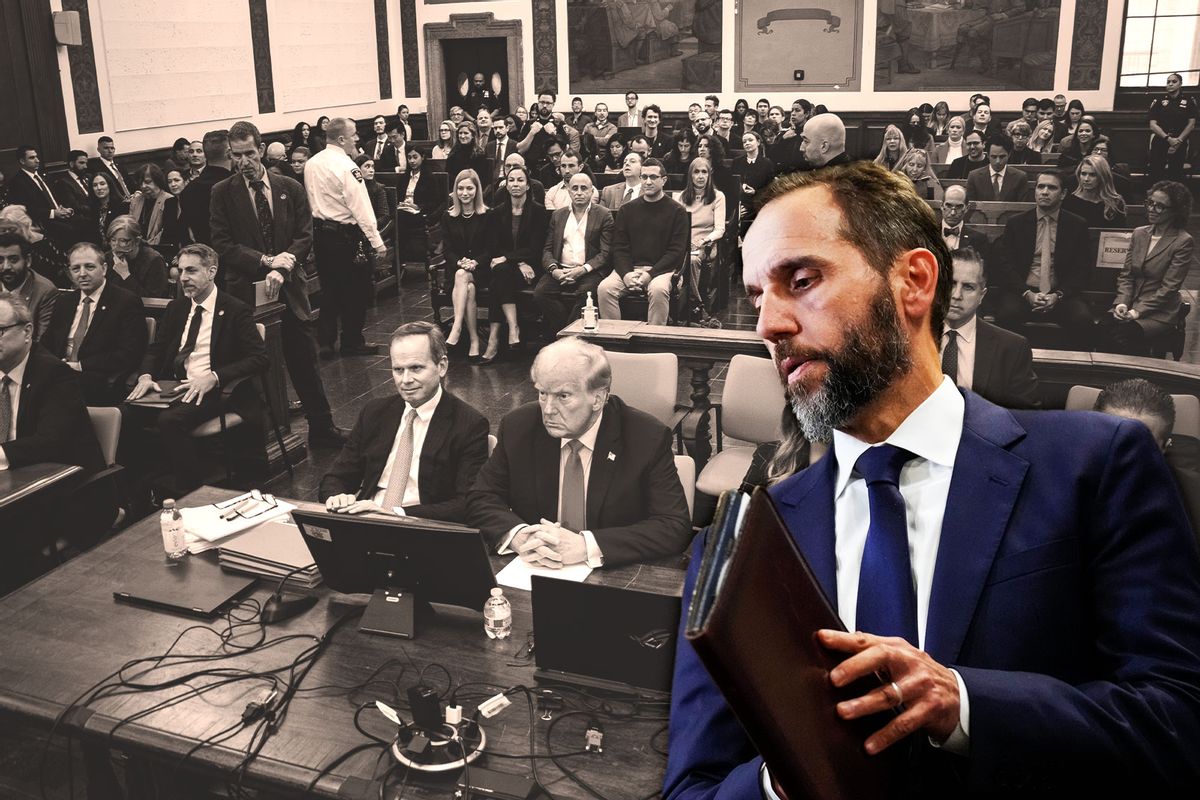Televising Trump’s trial would make Jack Smith’s job harder. Here’s why it should be allowed anyway

It is more than understandable why special prosecutor Jack Smith does not want his upcoming federal election interference trial against Donald Trump televised. Smith’s team argues, correctly, that streaming footage of the federal proceedings would create a “carnival atmosphere” featuring Trump grandstanding “like many fraud defendants try to do.” Instead, they are asking U.S District Judge Tanya Chutkan to deny requests made by more than a dozen news outlets to break federal protocol and stream footage from the trial, which is scheduled for March.
The urgency around this matter increased this week when Trump’s team filed a motion supporting the request for a televised proceeding. Having previously avoided the question of cameras in court, recently Trump has been out on the stump saying he wants “this trial to be seen by everyone in the world,” claiming, “I want sunlight.” Giving a defendant what he wants surely wouldn’t be good for the prosecution, right?
That is assuming Trump actually does want cameras in the courtroom. He may want the appearance that he welcomes “sunlight,” but it’s doubtful he wants the actual sun shining on this courtroom for all to see. Trump and his lawyers know better than anyone that a televised trial would likely backfire on Trump in the 2024 presidential election by reminding voters that he’s a lying, whining monster who tried to end our democracy as his last act in office.
Want more Amanda Marcotte on politics? Subscribe to her newsletter Standing Room Only.
It would probably make the work of the trial easier for Smith and his team if they could avoid camera-caused chaos in and around the courtroom. But there’s no reason to believe Trump won’t try to turn the proceedings into a circus anyway, by lying his head off to the TV cameras gathered outside or other spectacles. At least if there are cameras inside the court, the public will have a chance to hear the prosecution counter Trump’s claims with evidence.
There are two good reasons to believe the Trump team’s request for cameras is wholly insincere. First, the filing itself appears to be written to be maximally insulting to Judge Chutkan, with its claim she has “denied President Trump his inalienable rights.” It’s a lie in every word, starting with the fact that Trump is not president. Insulting a judge would not be a productive move in a sincere request. On the contrary, it reads like they are baiting her into denying the request.
Second, as legal experts point out, Trump’s team is playing a shell game by first claiming to have no opinion on the matter, then changing their minds once it became clear the request for cameras was unlikely to be fulfilled.
A reasonable assumption is Trump wants the pretense of transparency without the risks. If the likelihood of cameras in the court shifted in favor, you can bet Trump’s lawyers would suddenly find an excuse to argue against their presence. The reason is straightforward: The more attention people pay to this case, the worse it will likely be for Trump politically.
In general, Trump’s popularity is inversely proportional to how much people have to hear about him on any given day. He is doing pretty well in the polls now; most Americans don’t follow the news closely, which helps them forget how deeply aggravating his whining can be. That’s how Trump can be confident enough to call more than half the country “vermin,” promising to “root” them “out.” He knows the only people paying attention right now are his base of fellow fascists and the politically aware liberals who oppose him. Those whose votes will be up for grabs likely have no idea what he’s saying.
Trump’s single best hope for a positive political outcome is for the news media to give his trials less coverage due to the lack of footage and visuals. As the January 6 hearings in the House demonstrated, when reminded of the Capitol riot and Trump’s role in instigating it, a majority of Americans blame him for it. It’s only when the memory starts to fade that swing voters start to entertain the notion that he wasn’t so bad. In a televised trial, Trump would be sitting right there, glowering and muttering, just radiating guilty energy.
Want more Amanda Marcotte on politics? Subscribe to her newsletter Standing Room Only.
Of course, if there are cameras, Trump will pull shenanigans. He suffers from a bouquet of personality disorders that make it impossible for him to behave. His stunts are also lucrative. While most people find Trump’s unrestrained sociopathy repulsive, it does open up the wallets of the MAGA base. That’s likely why his lawyers encourage his antics even as they undermine his legal footing: If they don’t let him continue to bamboozle Fox News junkies out of their Social Security checks, will they even get paid?
It might be good for fundraising, but it’s not a sound legal strategy. History shows Trump’s big mouth only hurts his case, especially in a legal situation where his lies can be countered with facts and exposed with cross-examination. For instance, Trump’s taped deposition in the E. Jean Carroll rape-and-defamation trial ended up nuking lingering doubts about his guilt. He all but confessed, and used the word “fortunately” when describing how men often get away with rape. It’s worth remembering that Trump talked a big game about how he couldn’t wait to testify in that trial, as well.
Spoiler: The coward never showed. Competent lawyers absolutely would not put him on the stand anyway — the man is emotionally incontinent and too proud of his crimes to avoid confessing.
This is a complicated situation in many ways, as demonstrated by the situation in Fulton County. District Attorney Fani Willis has seen a handful of guilty pleas entered in her racketeering case against Trump and his gang for their coup efforts in Georgia. This week, someone released videos of the interviews defendants gave in exchange for leniency. Willis is furious, accusing Trump allies of attempted witness intimidation.
But these videos are not good for Trump. The picture painted even by witnesses still loyal to him is of a man whose intent was always to overturn an election and illegally remain in power, and who only concocted the Big Lie as a justification. A former Trump lawyer even recalls speaking with Trump’s right-hand man Dan Scavino and being told, “The boss is not going to leave under any circumstances. We are just going to stay in power.”
Want more Amanda Marcotte on politics? Subscribe to her newsletter Standing Room Only.
Will the people who need to see that video see it? Probably not. It’s mostly being shared by liberals who already believe Trump to be guilty. The “not sure” voters who could determine the 2024 election’s outcome are not paying attention. Televised trials could change that. Courtroom drama sucks in people who might otherwise ignore the story — even more so if there’s a “carnival” atmosphere. The barkers and clowns that manifest when Trump and cameras are present would create a spectacle that reminds viewers what a vote for Trump really means.
Of course, Willis and Smith aren’t focused on the election — nor should they be. Their job is to prosecute this case in court, and Trump’s antics only make that harder to do while keeping their sanity. From that perspective, Smith’s desire to keep cameras out of the court makes perfect sense. No one wants to do their job while someone is honking a giant horn in their face.
And yet, Smith indicted Trump on the grounds he had violated the rights of all Americans, specifically “the right to vote, and to have one’s vote counted.” If we are all victims of that crime — and I agree that we are — then we have a right to bear witness to the trial. Since they can’t pack hundreds of millions of victims into the courtroom, cameras are the best option. If the concern is that cameras will somehow help Trump, it’s time to get past it.
Read more
about Trump’s legal strategies


